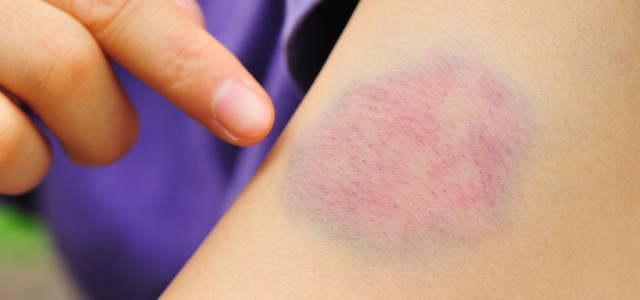You wake up and start to get ready for the shower when you notice in the mirror a big bluish mark on your skin. You poke this mark and realize it’s a bruise. You have not a slightest recollection of where you even got the bruise. This tends to occur to you quite often. Well, there can be a lot of reasons why you tend to bruise easily. The colorful mark is left on the skin due to trauma that is caused by a ruptured blood vessel underneath the skin. You can expect a tiny mark on your armwhen you accidentally hit yourself with the car door or on your leg when you hit your bedside table. Though, getting a bruise just
because someone squeezed your arm slightly or ghost bruises suddenly appearing on
your skin may appear alarming. No, don’t rush to the emergency room just yet. There can be different reasons why this could be happening to you. Below can be some of the major factors why you easily bruise.
Age
Our body changes as we grow older, especially our skin. The skin starts to lose elasticity and the protective fatty layer on our skin start to become thin. This fatty layer acts as a cushion when we fall or bump into anything. This causes our skin to become more sensitive to pressure. It will take less force for your skin to bruise than you were younger.
Purpuric Dermatosis
Purpuric Dermatosis is a vascular condition that is common in the elderly. This condition creates thousands of tiny bruises on the body, but usually appears on the shins. These bruises are the results of leaking of red blood cells from small capillaries. This condition can affect anybody, consult your doctor on treatments and medication for this condition.
Blood Disorders
People that suffer from any type of blood disorder such as leukemia and hemophilia will experience unexplained bruising. This is often due to the bloods inability to clot properly. If you tend to experience Severe and frequent bruising, it’s wise to consult your doctor on possible blood disorders and test that you can perform to determine the cause of your easy bruising. This can also rule out any serious conditions.
Pale Skin
Pale skin doesn’t entirely make you bruise easily, but it can make bruises more visible. Most people can acquire bruises everyday, but are not able to notice it since it can adap
t to the skin tone.
Diabetes
People who suffer from diabetes are prone to skin discoloration for a variety of reasons. The most often culprit has been due to the underlying insulin resistance. Discoloration caused by diabetes in areas that tend experience abrasion such as the arms, legs and sides tend to be mistaken for bruises.If you have diabetes, consult your doctor on how to properly lessen these discolorations and prevent them.
Genes
You can thank your family members if you tend to bruise easily. This can be a hereditary problem, ask your grandparents about your family history on bruising.
Excessive Straining
During exercise, muscles that undergo excessive amounts of strain can lead to small blood vessels popping this then leads to microscopic tears in the muscles that will lead to a bruise. This type of bruising usually occurs when lifting heavy weights, excessive amounts of vigorous exercises and contact sports. This often is unavoidable unless you limit your exercise routine. If you have problems with blood disorders, it is best to regulate your exercise to avoid these bruises.
Medications
There are certain medications such as anti-platelet agents and aspirin that can cause you to bruise more easily. If you are taking any form of medication for a long period of time, consult your doctor about its side effects.
Any type of injury such as falling or strong impact can cause capillaries near the surface of the skin to break and cause red blood cells to leak. This gives you that reddish purple bruise on the skin’s surface, in time this will turn into the black and blue. When you start
to heal the bruise will typically fade into a yellow or browning color before disappearing completely. It’s virtually impossible to never acquire a bruise. If you tend to acquire them more often than others, then look through the factors above and see where you may fit in. If none of them are applicable go to your doctor for a professional consultation.
